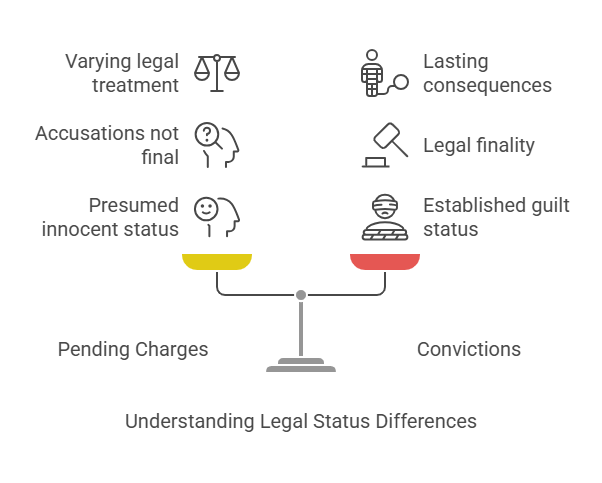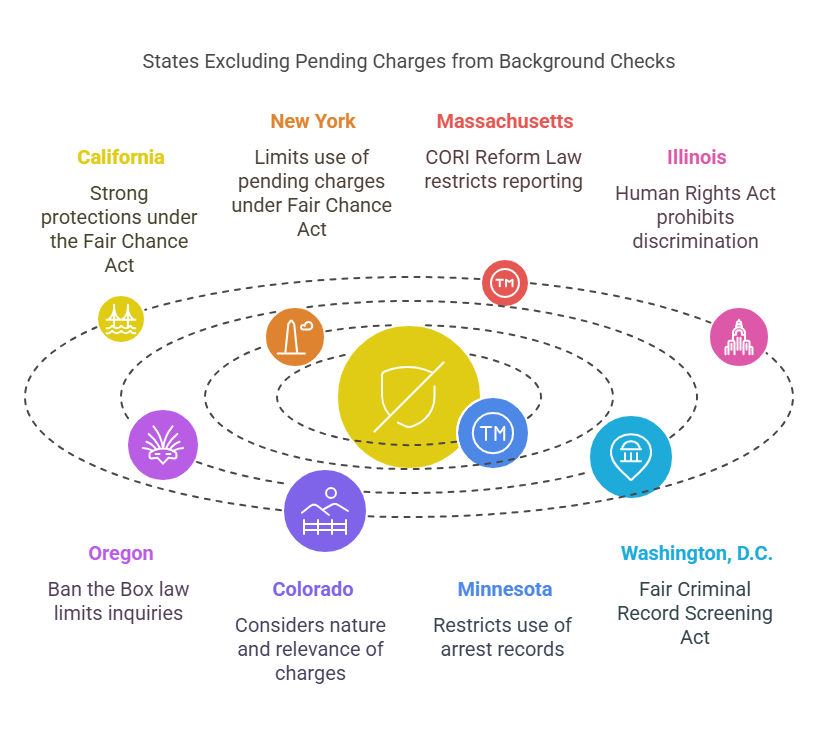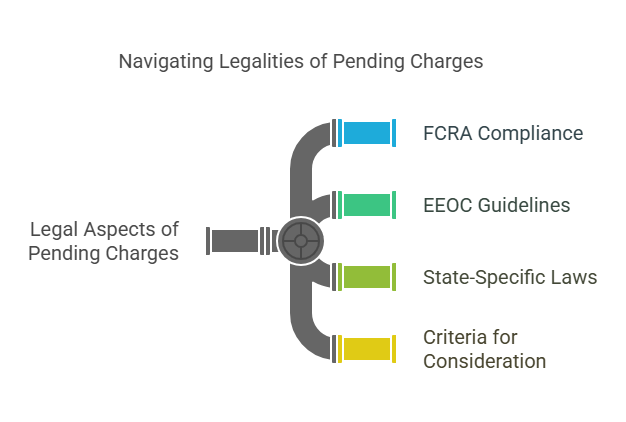States That Prohibit Pending Charges on Background Checks

Introduction and Overview of Pending Charges on Background Checks
Pending charges refer to criminal charges that have been filed against an individual but have not yet been resolved in court. This means that the individual is still in the process of going through the legal system, and the outcome (such as a conviction or acquittal) has not been determined. In the context of a background check, pending charges appear as part of an individual’s criminal history but do not reflect a final judgment or conviction.
Pending charges are important because they are often viewed differently from convictions. A conviction indicates that the court has found the individual guilty beyond a reasonable doubt, while pending charges only suggest that someone is being accused of a crime and has yet to be proven guilty or not guilty. The distinction is crucial in determining how these charges are treated by employers, landlords, and others who conduct background checks.
How Do Pending Charges Differ from Convictions?

The key difference between pending charges and convictions lies in their legal status. While convictions are final legal determinations of guilt, pending charges are essentially “allegations” or accusations made against an individual. Here’s how the two differ:
- Pending Charges: The individual has been charged with a crime, but the case is still under investigation or in the judicial process. The person is presumed innocent until proven guilty. Pending charges do not carry the same weight as convictions because they represent accusations, not established guilt.
- Convictions: A conviction is the result of a court ruling that finds the individual guilty of the crime. Convictions have a lasting effect on an individual’s criminal record and can have serious consequences for employment, housing, and other aspects of life.
Because pending charges do not represent a final determination of guilt, they are often treated differently by the law, especially when it comes to employment and housing decisions. However, depending on the state and local laws, the way pending charges are handled can vary significantly.
Impact of Pending Charges on Employment and Housing Applications
Pending charges can have a significant impact on an individual’s job search, housing application, and other opportunities. When conducting background checks, employers and landlords typically review criminal records to assess whether an applicant has a history of criminal behavior that could affect their suitability for a position or tenancy. While convictions are the primary focus, pending charges may also come up in a background check, depending on the jurisdiction and the type of check being conducted.
- Employment: Employers may hesitate to hire someone with pending charges, especially if the charges are related to violent crimes or other offenses that might impact the safety and productivity of the workplace. However, some employers might be more lenient, especially if the pending charges are not severe or have been pending for a long time.
- Housing: Landlords may also use pending charges as a reason to deny rental applications, particularly if the charges suggest potential risks to the property, other tenants, or the community. However, many landlords are now more cautious about rejecting applicants based on pending charges alone, especially given the legal complexities involved.
Why Do Some States Prohibit Reporting Pending Charges?
Several states have passed laws that prohibit or limit the reporting of pending charges on background checks. The rationale behind this decision is to prevent individuals from being unfairly penalized before a court has made a final ruling on their case. In essence, pending charges are seen as accusations, and individuals should not be judged or discriminated against based solely on unproven allegations.
The exclusion of pending charges from background checks helps ensure that applicants are not prematurely or unjustly excluded from opportunities based on the presumption of guilt. By removing pending charges from background checks, states aim to provide individuals with a fair chance at employment, housing, and other critical aspects of life, even if they are facing legal challenges.
Moreover, reporting pending charges can lead to discrimination and bias, as employers or landlords might be influenced by the mere presence of charges, even though the individual has not yet been convicted. Excluding pending charges helps to mitigate the risk of unfair judgment and supports the principle of “innocent until proven guilty.”
The Importance of Understanding How Pending Charges Affect Job Opportunities
For job seekers, understanding how pending charges are treated in background checks is critical. The presence of pending charges can complicate the application process, but it’s important to know how they are handled in your state or jurisdiction. In some states, pending charges may not even appear on a background check, while in others, they could be a significant factor in the hiring decision.
Knowing the laws and regulations in your state can help you navigate the job application process more effectively and reduce the stress of not knowing whether pending charges will affect your prospects. In some cases, you may be able to explain the situation to employers or landlords, especially if the charges are old or unrelated to the position you’re applying for.
It’s also important to remember that some employers are willing to overlook pending charges, especially if they are not related to the type of job being offered. Many organizations are increasingly focused on providing second chances to individuals with criminal histories, and some states and cities are passing laws that prohibit discrimination based on pending charges.
States That Prohibit Pending Charges on Background Checks

Several states have enacted laws to prohibit the inclusion of pending charges on background checks. These states seek to protect individuals from discrimination or unjust treatment based on accusations that have not yet been proven in court. While some states have broad prohibitions, others limit the reporting of pending charges in specific situations. Here are some of the states that have taken measures to exclude pending charges from criminal background checks:
1. California
California has strong protections for job applicants, particularly under the California Labor Code and the Fair Chance Act. This law, often referred to as “Ban the Box,” prevents employers from asking about criminal history, including pending charges, until after a conditional offer of employment has been made. Employers are prohibited from considering pending charges or arrests that did not lead to conviction. The rationale behind this is to give individuals the chance to be evaluated based on their qualifications rather than solely on their pending legal matters.
2. New York
New York State also limits the use of pending charges in employment background checks. Under the New York City Fair Chance Act, employers are restricted from considering pending charges or arrests unless the applicant is found guilty of the charge. In New York State, employers are required to assess the relevance of the criminal record to the specific job position and cannot automatically disqualify applicants based on pending charges.
3. Massachusetts
Massachusetts has strict laws regarding the use of criminal history in hiring practices, including pending charges. The state’s “CORI Reform” (Criminal Offender Record Information) Law allows individuals to request their criminal records and limits the information available to employers. Pending charges are typically not reported to employers until there is a final verdict in the case, ensuring that individuals are not judged prematurely.
4. Illinois
In Illinois, the Illinois Human Rights Act prohibits employers from using a pending criminal charge as a reason to deny employment. This applies to all forms of employment, including public and private sector jobs. Pending charges are not allowed to be disclosed during background checks unless a conviction has been reached. The law aims to ensure that job applicants are not discriminated against based on unproven allegations.
5. Oregon
Oregon’s “Ban the Box” law is another example of a state that limits the use of pending charges in employment decisions. In Oregon, employers are prohibited from asking about criminal history, including pending charges, during the initial stages of hiring. Employers must wait until after a conditional job offer has been made before conducting a background check and considering the criminal record, including pending charges.
6. Colorado
Colorado has adopted laws that protect individuals from discrimination based on pending charges. The state’s law prohibits employers from denying employment based solely on pending criminal charges. Employers are also required to consider the nature of the charges, the length of time the charge has been pending, and the relevance of the charge to the job position before making a decision.
7. Minnesota
Minnesota’s employment laws are designed to ensure that pending charges are not held against an individual when applying for a job. Employers cannot automatically disqualify a job applicant based on pending criminal charges. The state also restricts employers from using arrest records or charges that did not lead to a conviction during the hiring process.
8. Washington, D.C.
Washington, D.C., has laws that prevent employers from considering pending criminal charges in employment decisions. The Fair Criminal Record Screening Amendment Act prohibits employers from asking about or considering pending charges, except in certain circumstances (such as when the charges are directly relevant to the job).
9. Nevada
Nevada law prohibits the use of pending charges in employment background checks. Employers in Nevada are prohibited from asking about or considering any arrest, charge, or criminal accusation that is still pending. The focus remains on convictions rather than unresolved criminal matters.
Why These States Exclude Pending Charges
The reasoning behind excluding pending charges from background checks varies from state to state but generally centers on fairness and protecting individuals’ rights. Here are some key reasons for these legal protections:
- Presumption of Innocence: In the United States legal system, individuals are presumed innocent until proven guilty. Pending charges do not represent proof of guilt, so excluding them from background checks ensures that people are not penalized for something they have not been convicted of.
- Reducing Discrimination: People with pending charges may face significant barriers to employment or housing, even though they have not been convicted. By prohibiting the reporting of pending charges, states aim to reduce discrimination against individuals who are still navigating the legal process.
- Fair Hiring Practices: Excluding pending charges from background checks ensures that employers are not prematurely judging applicants. This encourages fairer hiring practices that focus on qualifications, experience, and suitability for the role, rather than unproven allegations.
- Supporting Reentry: Many states that exclude pending charges from background checks also have laws designed to help people with criminal histories reintegrate into society. This includes providing them with opportunities to obtain employment, which is critical for reducing recidivism and promoting rehabilitation.
How the Treatment of Pending Charges Varies by Industry
While many states have laws prohibiting the inclusion of pending charges on background checks, the application of these laws can vary depending on the industry or type of position being applied for. In some industries, particularly those involving public safety, healthcare, or government positions, pending charges may still be considered, even if the state law prohibits their inclusion.
- Healthcare: Healthcare providers and employers in the medical field may have different standards for evaluating pending charges, especially if the charges involve issues related to patient care or safety. In some cases, healthcare employers may be required to conduct more stringent background checks.
- Government Positions: Government positions, particularly those involving national security or law enforcement, may involve more comprehensive background checks, including the consideration of pending charges. Even if the state law excludes them from standard employment decisions, federal regulations or agency policies may allow pending charges to be reviewed.
- Private Sector Jobs: In most cases, private-sector employers must adhere to state laws that prohibit the use of pending charges in hiring decisions. However, certain high-risk industries, such as finance or security, may conduct more in-depth background checks and consider pending charges if deemed relevant to the job.
Exact Background Checks Services
At Exact Background Checks, we assist both employers and individuals by ensuring compliance with local and state background check laws. For employers, we provide accurate and up-to-date information about criminal histories while adhering to state-specific regulations that prohibit the inclusion of pending charges. Our team ensures that background checks are thorough, compliant, and fair, helping employers make informed decisions without violating legal requirements.
We also help job applicants navigate the complexities of background checks and ensure their rights are protected. Our services include providing guidance on how pending charges are handled, and we offer resources to help individuals understand how background checks may affect their opportunities.
States That Prohibit Pending Charges on Background Checks
| State | Law/Regulation | Impact |
|---|---|---|
| California | Fair Chance Act (Ban the Box) | Prevents employers from considering pending charges until a conditional job offer is made. |
| New York | New York City Fair Chance Act | Prohibits considering pending charges unless a conviction is reached. |
| Massachusetts | CORI Reform Law | Limits the reporting of pending charges on employment applications. |
| Illinois | Illinois Human Rights Act | Prevents employers from using pending charges in employment decisions. |
| Oregon | Ban the Box Law | Employers cannot ask about pending charges during the hiring process. |
| Colorado | Colorado Employment Law | Prohibits the use of pending charges as a reason for employment denial. |
| Minnesota | Minnesota Employment Law | Prevents employers from disqualifying applicants based on pending charges. |
| Washington, D.C. | Fair Criminal Record Screening Amendment Act | Prohibits employers from considering pending charges in employment decisions. |
| Nevada | Nevada Employment Law | Pending charges cannot be included in background checks for employment. |
Legal Aspects of Pending Charges on Background Checks

Understanding the legal framework surrounding pending charges on background checks is crucial for both job seekers and employers. Various federal and state laws regulate how background checks are conducted and what information can be considered in employment or housing decisions. Below are key legal aspects that impact the reporting and use of pending charges in background checks.
1. Fair Credit Reporting Act (FCRA) Compliance
The Fair Credit Reporting Act (FCRA) governs how consumer reporting agencies (CRAs) collect, use, and distribute background check information. According to the FCRA:
- Employers must obtain written consent from applicants before conducting a background check.
- Applicants must be given a pre-adverse action notice if their pending charges or criminal record may lead to a negative hiring decision.
- Employers must allow candidates to dispute inaccuracies before making a final employment decision.
Although the FCRA does not explicitly prohibit the inclusion of pending charges, it ensures that background check reports are fair, accurate, and transparent.
2. Equal Employment Opportunity Commission (EEOC) Guidelines
The EEOC enforces anti-discrimination laws related to hiring and employment. According to EEOC guidelines:
- Employers cannot implement blanket policies that disqualify applicants based on criminal records (including pending charges).
- Employers must conduct individualized assessments, considering factors like the nature of the charge, the relevance to the job, and whether the individual poses a risk in the workplace.
- Disqualifying an applicant based on pending charges could lead to claims of discrimination, especially if the policy disproportionately affects certain racial or ethnic groups.
3. State-Specific Laws on Pending Charges
While some states (like those listed in Part 2) prohibit employers from considering pending charges, other states allow employers to use them in hiring decisions. Some state laws provide additional protections, such as:
- Sealing and Expungement Laws: Certain states allow individuals to seal or expunge pending charges after a specific period or if the charges are dismissed.
- Ban the Box Laws: Many states and cities have enacted Ban the Box laws, which prevent employers from asking about criminal history on job applications and delaying background checks until after a conditional job offer is made.
- Fair Chance Hiring Laws: These laws further limit how criminal records (including pending charges) can be used in hiring decisions, ensuring fair employment opportunities for those with past legal issues.
4. When Can Employers Consider Pending Charges?
In states that allow employers to consider pending charges, they must typically meet specific criteria, such as:
- The pending charge must be relevant to the job (e.g., fraud charges for a finance position).
- The employer must determine whether the charge poses a significant risk to the workplace.
- The employer must follow FCRA and EEOC guidelines to ensure the process is fair and non-discriminatory.
Failure to comply with these legal requirements can lead to lawsuits, fines, and reputational damage for employers.
Frequently Asked Questions (FAQs)
Can employers deny a job based on a pending charge?
It depends on the state and industry. Some states prohibit employers from considering pending charges, while others allow it if the charge is relevant to the job. Employers must also follow EEOC and FCRA regulations when making hiring decisions.
How can I find out if my state prohibits pending charges on background checks?
Check your state’s employment laws or consult an employment attorney. You can also review Part 2 of this article, where we list states that restrict the use of pending charges in background checks.
What should I do if my pending charge appears on a background check?
If a pending charge appears on your background check:
- Request a copy of your background report.
- Verify accuracy and ensure the charge is not outdated or misreported.
- Dispute errors with the background check company if incorrect information is listed.
- Consult a lawyer if you believe your rights have been violated.
How long do pending charges stay on a background check?
Pending charges remain on a background check until the case is resolved. If the charge is dismissed or you are found not guilty, you may be able to expunge or seal the record, depending on state law.
Can landlords deny housing based on a pending charge?
Yes, but this depends on the state and the landlord’s policies. Some states restrict landlords from considering pending charges, while others allow it. If you believe you were unfairly denied housing due to a pending charge, you may have legal recourse under Fair Housing Laws.
Can employers deny a job based on a pending charge?
It depends on the state and industry. Some states prohibit employers from considering pending charges, while others allow it if the charge is relevant to the job. Employers must also follow EEOC and FCRA regulations when making hiring decisions.
How can I find out if my state prohibits pending charges on background checks?
Check your state’s employment laws or consult an employment attorney. You can also review Part 2 of this article, where we list states that restrict the use of pending charges in background checks.
What should I do if my pending charge appears on a background check?
If a pending charge appears on your background check:
- Request a copy of your background report.
- Verify accuracy and ensure the charge is not outdated or misreported.
- Dispute errors with the background check company if incorrect information is listed.
- Consult a lawyer if you believe your rights have been violated.
How long do pending charges stay on a background check?
Pending charges remain on a background check until the case is resolved. If the charge is dismissed or you are found not guilty, you may be able to expunge or seal the record, depending on state law.
Can landlords deny housing based on a pending charge?
Yes, but this depends on the state and the landlord’s policies. Some states restrict landlords from considering pending charges, while others allow it. If you believe you were unfairly denied housing due to a pending charge, you may have legal recourse under Fair Housing Laws.
Conclusion
Understanding how pending charges affect background checks is crucial for job seekers, employees, and employers. While some states prohibit the inclusion of pending charges, others allow employers to consider them if relevant to the job. Laws like the FCRA, EEOC guidelines, and Ban the Box initiatives aim to ensure fairness and prevent discrimination in hiring and housing decisions.
For job applicants, it is essential to stay informed, verify your background check, and understand your legal rights when dealing with pending charges. Employers should also ensure they comply with federal and state laws to avoid potential legal consequences.
At Exact Background Checks, we help businesses and individuals navigate the complexities of background checks while ensuring compliance with state and federal regulations. Whether you need accurate background screening or legal guidance on pending charges, we are here to assist you.




Well I already had instructions on a job position which was a clod puller i9 filled out drug screening paper work questinir and clothing that had to be worn for orientation job on hand then I waited and waitited on them to email me the day to start orientation never heard from them till I called a week later and they told me they couldn’t hire me because of a pending charge but then I got a letter from hiegher right saying it wasn’t my background when he told me it was a pending charge I say it’s descrmination I have all paperwork from Cargill and higher Rights it descrmination I say